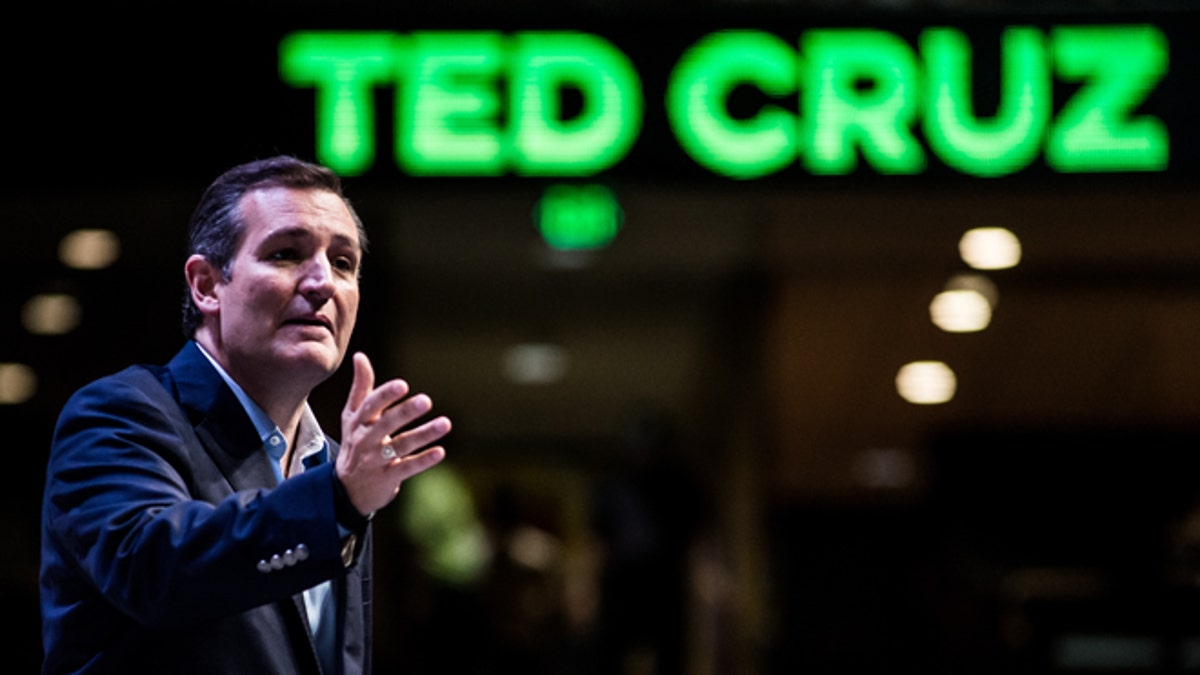
Sen. Ted Cruz speaks at the Heritage Action Presidential Candidate Forum September 18, 2015 in Greenville, South Carolina. (2015 Getty Images)
Ted Cruz has been many places since declaring his bid for the Republican presidential nomination, but Puerto Rico is not one of them.
That doesn't mean that the firebrand Texas lawmaker's campaign is ignoring the prospective primary voters in the U.S. territory. In fact, more than any other candidate this presidential election, Cruz – who currently sits in the middle of the crowded GOP field – has made a concerted effort to tap into Puerto Rico and the other U.S. territories oft-overlooked voting bloc.
The Cuban-American lawmaker and his supporters have been inundating potential voters in Puerto Rico – and the territories of the Commonwealth of the Northern Mariana Islands, American Samoa, Guam and the Virgin Islands – with visits from surrogates (Cruz’s father made a plea for his son in the Virgin Islands), phone calls along with meet-and-greets and sit-downs with mayors and party leaders.
The commonwealth of Puerto Rico for years has been ignored by presidential candidates because the island's residents, under the Voting Rights Act, cannot vote for a U.S. president. But in a crowded GOP field, when every delegate counts, places that have been overlooked like Puerto Rico and other territories are suddenly quite popular.
Puerto Rican residents can vote in the Democratic and Republican primaries – sending 44 and 23 delegates to the conventions, respectively. In comparison, the crucial early voting state of New Hampshire also sends 23 delegates to the Republican convention and 21 to the Democratic convention.
"Puerto Rico is a very powerful voting bloc," Evelyn Pérez-Verdia, a political analyst at Political Pasión, told Fox News Latino. "The intelligent candidate realizes that to win the nomination you have to go beyond the normal demographics in places like Iowa and New Hampshire."
A host of other White House hopefuls have made, or are planning to make, a trip to Puerto Rico. Jeb Bush travelled to the island in April, before he even declared his candidacy; Marco Rubio made a tour of the island in July; former neurosurgeon Ben Carson is planning to make a stop there; and former Maryland Gov. Martin O'Malley became the first candidate to officially make a trip to Puerto Rico when he visited back in July.
"[O'Malley] was the first one to speak out and say Puerto Rico should have bankruptcy, like states [have]" Gabriela Domenzian, the O'Malley campaign's Director of Public Engagement, told FNL. "From the beginning of his campaign, Gov. O'Malley showed leadership in something that affects our hemisphere."
Democratic frontrunner Hillary Rodham Clinton was on the island the same day as Rubio, where she defended her support for giving Puerto Rico bankruptcy protection and slammed her Republican rivals during a round-table discussion.
"Not a single Republican in Washington has stepped up to support Puerto Rico," said Clinton, who won Puerto Rico's 2008 Democratic primary election and their 44 delegates.
Political observers say that these forays into Puerto Rico may be a ploy to win some bargaining power come convention time when the island's delegates could prove crucial in choosing the party's candidate.
It has also been argued that these trips to the island are pleas to the growing Puerto Rican communities in Florida and New York – two states that are seen as crucial in both the primary and general elections.
Cruz, who is also making concerted efforts in more traditional early voting states like Nevada and Iowa, has his eyes on Puerto Rico and the other territories in an attempt to use an obscure provision in the Republican National Committee's requirement to secure the nomination.
The Republican National Committee rule No. 40 (b) stipulates that "Each candidate for nomination for President of the United States and Vice President of the United States shall demonstrate the support of a 40 of 42 majority of the delegates from each of eight (8) or more states, severally, prior to the presentation of the name of that candidate for nomination."
In layman's terms, if a candidate wants to get the presidential nod, he or she needs to have the support of Puerto Rico and the other territories.
"Whether you're getting Texas, Michigan and Ohio, or the Virgin Islands, Puerto Rico and American Samoa, each has an equal voice when it comes to nominating candidates to put them on the ballot at the convention," Saul Anuzis, the former chairman of the Michigan Republican Party, told Politico.
But that rule could change sometime next July when delegates arrive in Cleveland.
The factors working against Cruz is that the territories tend to vote in a bloc and favor the more moderate, so-called establishment candidates as opposed to more conservative candidates like Cruz. Delegates from the territories picked John McCain in 2008 and Mitt Romney in 2012.
That should be good news to Jeb Bush's struggling campaign.












































